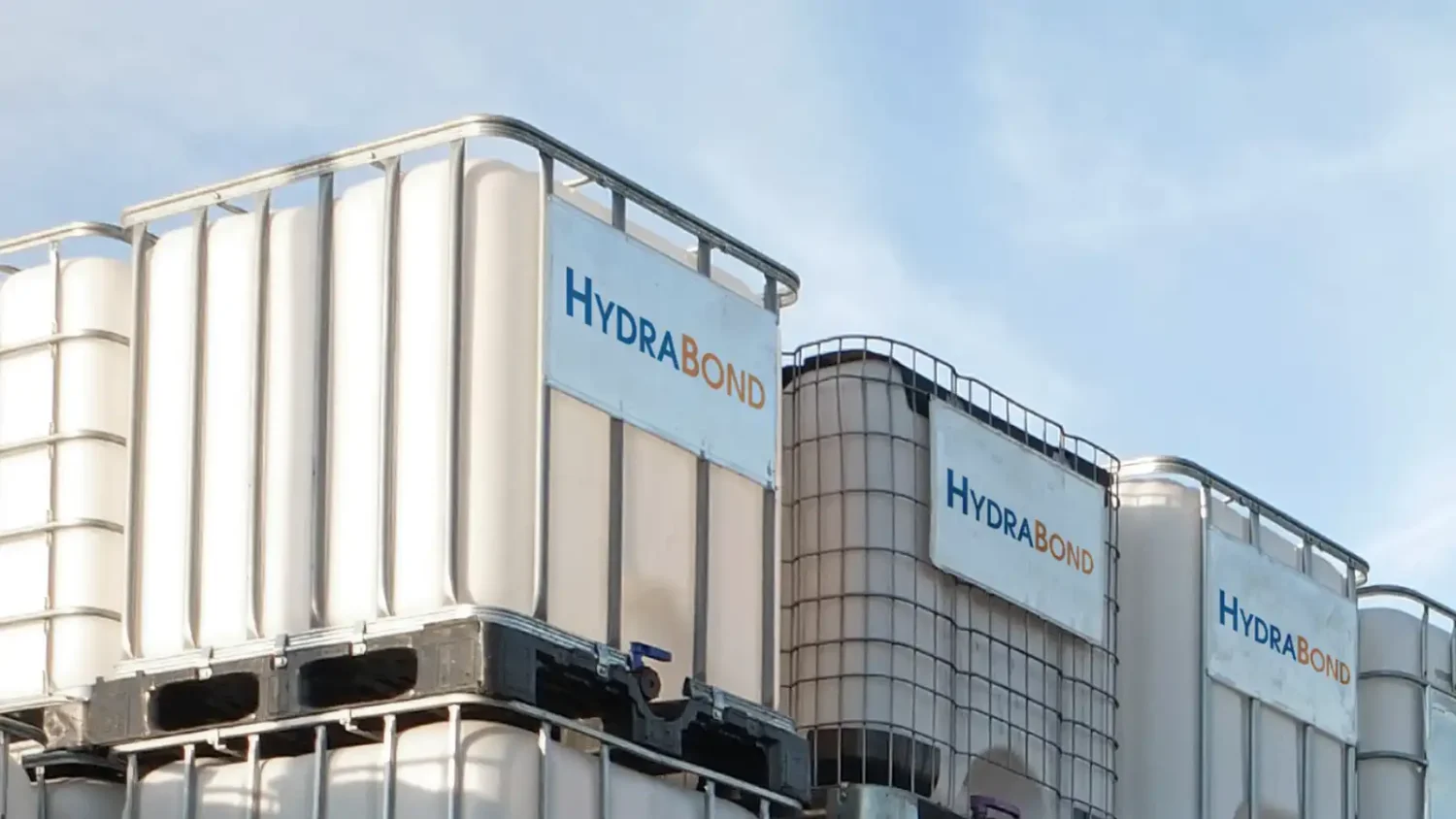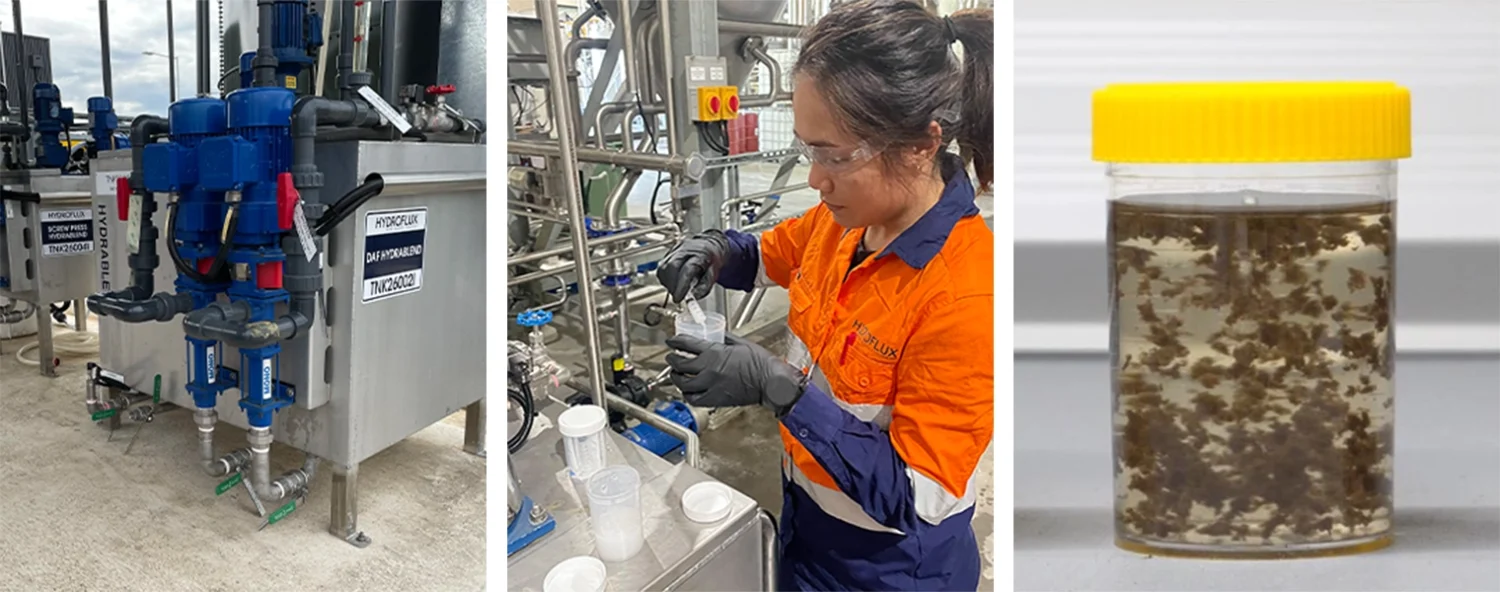
HydraBOND® Polymer Series

Optimise your System with Advanced Flocculants and Polymers for Water and Wastewater Treatment
Hydroflux Utilities offers a full range of proprietary flocculants and polymers for wastewater treatment. These are designed exclusively for the optimised treatment of water and wastewater. They also aid in the chemical conditioning of sludge. HydraBOND® polymers meet diverse applications, ensuring operational excellence and cost efficiency for your treatment plant.
Our HydraBOND polymers are used in a variety of applications including:
- Water treatment clarification or flotation
- Wastewater treatment clarification or flotation
- Sludge flocculation prior to thickening or dewatering
Why choose Hydroflux Utilities as your HydraBOND Polymer Supplier?
Whether you are using polymer for the flocculation of wastewater prior to treatment in a dissolved air flotation unit (DAF) or clarifier, for sludge thickening or dewatering, or in many other water and wastewater applications, using the right polymer will not only enhance the performance of the process but also reduce OPEX. With our comprehensive range of cationic, anionic and nonionic polymers in both liquid emulsion and powder forms you can have confidence that you will receive the right polymer that meets your objectives guaranteeing cost-effectiveness and optimising overall operational efficiency.

Hydroflux Utilities is more than just a chemical supplier
Hydroflux Utilities goes beyond being just a chemical supplier; we become your trusted advisor.
When engaged in a chemical supply contract, we schedule free regular site visits. During these visits, Hydroflux professionals discuss plant performance and chemical usage. They also cover other operational aspects such as sludge generation. We offer professional advice for further optimisation, ensuring continuous improvement in your wastewater treatment processes.
Efficient national chemical supply chain
Whether you are purchasing HydraBOND in pales or IBCs, Hydroflux has dedicated logistics teams that ensure a streamlined supply of chemicals to customers from our warehouses. With well-established supply chains, chemicals are delivered to your site seamlessly and on time, minimising disruptions to your operations.
We rent chemical dosing systems too
Renting HydraBOND chemical dosing equipment allows you to access the latest technology without the high upfront costs and long-term commitment of purchasing. Whether you need temporary solutions for seasonal demands, emergency situations, or trial periods before investing in permanent systems, renting can provide the adaptability and support necessary to ensure optimal performance of your process operations.
Click here to visit our Rentals page.
Sustainable Solutions
As Australia’s first certified carbon-neutral water and wastewater chemical supply and service business, we focus on sustainability. Developing and delivering sustainable solutions for treatment plant operation and maintenance is at the core of what we do. Our HydraBOND polymer flocculants are the most sustainable in the Australian and New Zealand market. They are not just effective at protecting our valuable water resources but are also carbon-neutral. Click here to find out what this means for you.

Polymer and Flocculant FAQs
Cationic and anionic polymers are both used in water and wastewater treatment depending on the charge of the suspended particles. Cationic polymers, which are positively charged, are used when the particles in the water are negatively charged, making them suitable for treating municipal and industrial wastewater containing organic matter, such as sewage sludge and effluents from food processing and pulp and paper manufacturing. Conversely, anionic polymers, which are negatively charged, are used when the particles in the water are positively charged, making them ideal for treating mineral and inorganic particles found in mining operations and certain industrial wastewater treatments. The choice between cationic and anionic polymers is primarily based on the particle charge, but factors such as the water’s pH and any other specific treatment process prior such as coagulation also play important roles.
The amount of polymer needed for sludge dewatering ranges from 1 to 10 kilograms per ton of dry solids, depending on factors such as the type of sludge, its concentration, the specific polymer used, and the dewatering equipment employed such as screw presses, belt presses, chamber filter presses or centrifuges. Biological sludge usually requires higher polymer doses due to its higher organic content and water retention properties, whereas chemical sludge often needs less polymer. To determine the optimal polymer and dosage, it is ideal to conduct bench-scale tests, or even pilot-scale trials to tailor the treatment to specific sludge characteristics and operational conditions, however, Hydroflux Utilities has extensive expertise in sludge flocculation and dewatering and can usually select a suitable polymer based on previous successes.
The choice between high and low molecular weight polymers in water and wastewater treatment depends on the application and desired outcomes. High molecular weight polymers are generally better for flocculation due to their longer chains, which form larger and more robust flocs, enhancing settling rates and dewaterability. However, they are more shear-sensitive and can break down under high agitation. Low molecular weight polymers, being less shear-sensitive, are more effective in high-turbulence conditions and form smaller, more compact flocs, beneficial in some filtration and clarification processes. The decision should consider the specific treatment needs, including contaminant nature, water or sludge characteristics, dewatering equipment, and operational conditions.
Yes it does! The type and dosage of chemicals, such as coagulants and flocculants, influence the characteristics of the sludge, including its volume, density, and dewaterability. Effective chemical treatment can enhance the aggregation of suspended particles, resulting in a more compact and settleable or floatable sludge depending on whether you are using clarification or flotation technology for solids removal, which is easier to handle and dewater. Conversely, improper chemical dosing or selection can lead to excessive sludge production or poor sludge quality, complicating its management and disposal. Optimising the wastewater treatment chemical treatment program is crucial for optimum treatment and efficient sludge handling and minimising overall operational costs.
The choice between emulsion and powder polymers for wastewater treatment depends on the specific application and operational requirements. Emulsion polymers are typically easier to handle and dose, using relatively inexpensive blending equipment and are ready to use within a few minutes of solution preparation. Emulsion polymers are ideal for small to medium applications. On the other hand, powder polymers offer advantages in terms of storage, shelf life, and transport, as they are more stable and less prone to degradation than emulsions although they do take between 30 -90 minutes dilute and activate. Powder polymers are usually more cost-effective in large-scale operations where the cost of the blending and dosing equipment is high to ensure proper activation and performance. Ultimately, the choice between emulsion and powder polymers should consider factors such as handling logistics, cost of the polymer, cost of the blending and dosing plant and the specific characteristics of the wastewater being treated.
The Hydroflux Group
Hydroflux Utilities, being part of the Hydroflux Group has access to extensive expertise in water and wastewater treatment processes, mechanical and electrical design, programming and turnkey construction. By leveraging the collective knowledge and resources of the Hydroflux Group, Hydroflux Utilities ensures that you receive high-quality, innovative solutions that meet your specific needs and deliver sustainable results for your water, wastewater or sludge treatment processes.
